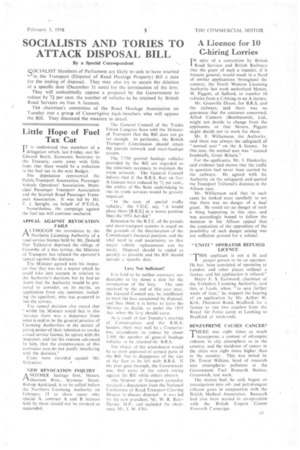A Licence for 10 C-hiring Lorries
Page 11

If you've noticed an error in this article please click here to report it so we can fix it.
I N spite of a contention by British Road Services and British Railways that the grant of such a transfer, if it became general, would result in a flood of similar applications throughout the country, the North Western Licensing Authority last week authorized Messrs. W. Piggott. of Salford, to transfer 10 vehicles from a C-hiring to an A licence.
Mr. Granville Dixon, for B.R.S. and the railways, said there was no guarantee that the customer concerned, Allied Canners (Boothstown), Ltd., might not decide to change from the applicants, or that Messrs. Piggott might .decide not to work for them.
Mr. F. Williamson, the Authority, said there was always the safeguard of "normal user" on the A licence. In this case, the normal user was " canned foodstuffs, Great Britain."
For the applicants, Mr. J. Dunkerley said evidence had shown that the traffic in question had never been carried by the railways. He agreed with the Authority on the safeguard, and quoted the Transport Tribunal's decision in the Allison case.
Mr. Williamson said that in such cases he looked most carefully to sec that there was no danger of a dual grant. He could see no danger of such a thing happening in this case, and was accordingly bound to follow the decision in the Allison appeal that the contention of the opposition of the possibility of such danger arising was not sufficient ground for a refugal.
" UNFIT " OPERATOR REFUSED LICENCE
"THIS applicant is not a fit and I proper person to he an operator. He hai been convicted of operating to London ana other places without a licence, and his application is refused."
Major F. S. Eastwood, chairman of the Yorkshire Licensing Authority, said this, at Leeds, when, "to save further waste of time," he stopped the hearing of an application by Mr. Arthur W. Kirk, Thornton Road. Bradford, for a licence to run two coaches from the Royal Air Force camp at Leeming to Bradford at week-ends.
RENZYPRENE CAUSES CANCER?
THERE was eight times .as much -benzyprene, a content of oil-engine exhaust, in city atmosphere as in the country, and the incidence of cancer in the cities was eight times higher than in the country. This was stated by Dr. Ernest Wilkins, head of research into atmospheric pollution at the Government Fuel Research Station, Greenwich, last week.
The station had, he said, begun an investigation into oiland petrol-engine exhaust gases in conjunction with the British Medical Association. Research had also been started in co-operation with the British Empire Cancer
esea rch Campaign.




















































